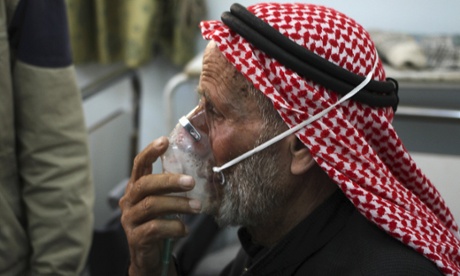Bashar al-Assad has become known as the Middle East’s great survivor since taking power in 2000. But in launching a chemical weapons attack in Idlib province this week, has the pariah president of Syria finally pushed his luck too far?
Assad denies responsibility for the Idlib atrocity, just as he denied responsibility for a notorious 2013 chemical weapons attack on civilians near Damascus. UN investigators blamed the regime for that incident and other reported CW attacks in 2014 and 2015.
The 2013 attack, which killed hundreds of people, crossed the “red line” set by Barack Obama, almost triggering US military intervention. But Obama (then US president) and the Republican-controlled Congress, hesitated after Britain’s parliament unexpectedly voted against military action.
Then the Russians effectively rescued their client, saving Assad’s bacon by brokering a deal supposedly removing his CW stockpile.
The US-Russia deal looks like a sham now. It provided for the use of military force if Assad did not comply. Luckily for him its provisions were never implemented, despite damning evidence uncovered by the UN.
Assad’s history of stubbornly denying the apparently undeniable stretches back to 2005 when Rafiq Hariri, the former Lebanese prime minister, was assassinated in Beirut. Hariri was the leader of the anti-Syrian opposition. Lengthy UN investigations found convincing evidence of Syrian regime complicity.
Although he denied it, Assad was forced to withdraw his troops from Lebanon. His capitulation was a political humiliation and strategic defeat. Many predicted Assad would fall. But somehow he held on.
Another big crisis erupted in 2011, when the Arab spring revolts spread to Syria. When he first came to power, the young, British-educated, Assad was seen as a potential reformer. But hopes of liberalisation petered out. His brutal response to the initially peaceful 2011 protests showed nothing had changed. All-out war ensued.
Yet while Assad has so far failed to defeat the rebel forces, he did not suffer the fate of Egypt’s Hosni Mubarak or Libya’s Muammar Gaddafi, who were both deposed. And in 2015, when he seemed on the brink of losing the war, Vladimir Putin, Russia’s president, stepped in, joining Iran in a successful attempt to save his neck. Assad had fallen on his feet once more.
Odd though it seems Assad struck lucky again when Islamic State seized control of large parts of Syria and Iraq. The jihadists’ principal fight was with pro-western forces and governments, not him. The rise of Isis fortified Assad’s specious claim to be fighting a solely terrorist insurgency. And it distracted the western powers.
Donald Trump’s election underlined that evolution. Trump’s only interest was the suppression of Isis. He explicitly rejected previous US-European insistence that Assad must step down, hailing him as an ally in fighting terror. This volte-face was replicated by Turkey, a key regional player.
But the Idlib atrocity appears to have revolted Trump. He called it an “affront to humanity” and said he was reconsidering his stance. Idlib could thus turn out to be a self-defeating gamble. Typically, the Syrian leader has recklessly overplayed his hand. Even his Russian friends seem embarrassed.
Has Assad gone too far this time? Trump faces the same post-Iraq, post-Afghanistan dilemmas faced by Obama. All the military options are problematic. Getting directly involved in Syria contradicts his “America First” non-interventionist outlook, set him on a collision course with Russia.











